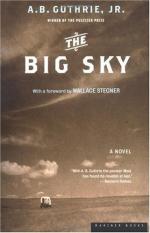|
This section contains 621 words (approx. 3 pages at 300 words per page) |

|
The Big Sky strikes me as a more successful tragedy and one more central to the Western mind [than Walter Van Tilburg Clark's The Ox-Bow Incident]. It possesses, like Clark's novel, the ring of tough-minded realism that the twentieth century has come to relish. It has, as well, the flavor of full authenticity in its reconstruction of the life of the mountain man between 1830 and 1843. But unobtrusively entered among the undisputably authentic details of the mountain man's external life is an interpretation that has more of myth than of demonstrable historical fact about it. This is the depiction of the mountain man's wilderness life as paradise. (p. 247)
The Big Sky does not merely celebrate the paradisiacal quality of the mountain man's life: like other Edens, this one becomes a paradise lost. Deliberately setting his novel at the moment when beaver were vanishing and settlers were starting over South...
|
This section contains 621 words (approx. 3 pages at 300 words per page) |

|


